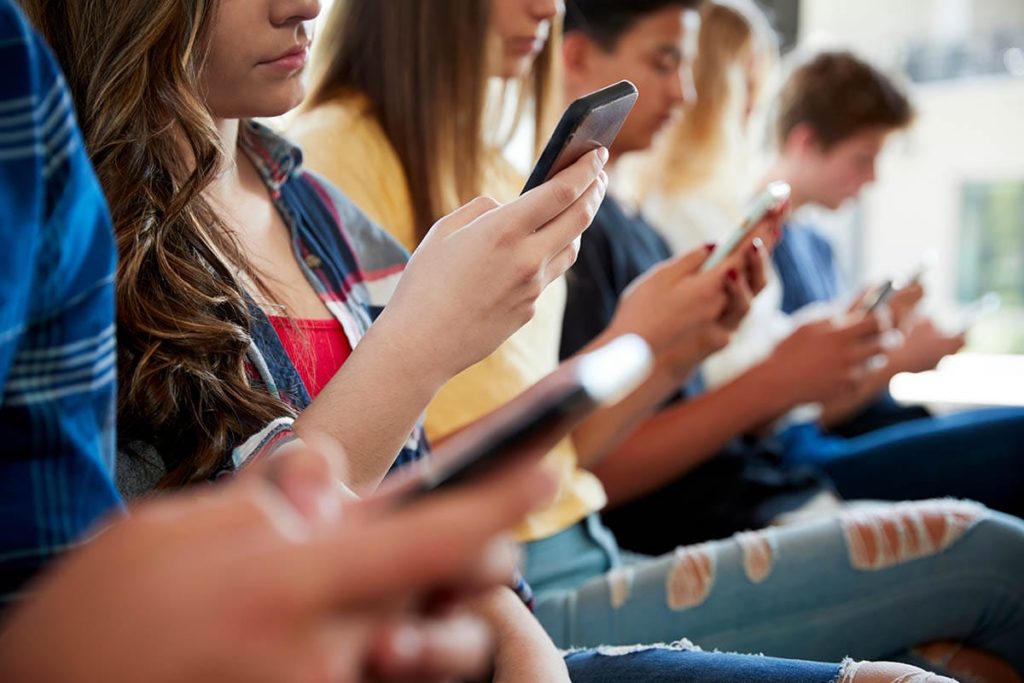Social media is fully ingrained into the fabric of everyday life, even more so for teens. Whether they are tweeting jokes, lurking on Instagram to see what their friends are doing, eating, or watching and making TikTok videos, many teenagers are spending hours a day scrolling through a variety of social media channels. The social media effects on teens can be minimal or severe, but whether you believe it to be nothing more than harmless entertainment or not, social media and teens is a topic of concern for many parents. If you are worried that your teen’s relationships are suffering because of their social media habits, contact us online or call 888.291.2309 today to learn how teen relationship therapy can help.
Teens and Social Media
Social media platforms like Instagram, Snapchat, and TikTok have the ability to foster an environment where teens are repeatedly exposed to unhealthy images and themes, such as a glamorization of drug use, unhealthy relationships, and a deterioration of their body image. Additionally, there’s mounting evidence of a connection between depression, social media, and teens. Teenagers who are extremely active on social media are reporting cases of depression at a significantly higher rate than their peers who are not using Instagram, Snapchat, and TikTok as frequently. While social media is likely not causing depression, online relationships and a fear of missing out (FOMO) could be marginalizing already vulnerable people and creating a precarious vacuum of loneliness and despair. These are the social media effects on teens that are most worrying.
Social Media Effects on Teens and Their Relationships
Social media offers a way for teens to stay in touch with relatives, make and build friendships, and stay current with any important cultural events. Looking specifically at how social media affects teens and their relationships, the amount of time a teen spends on their phone may interfere with genuine human interaction, be that with family at home or the friends they’ve had for years at school and in the neighborhood. Social media can have both positive and negative impacts on teen friendships and interactions with their peers. With a healthy balance between social media use and in-person contact, teens can thrive in positive, safe, and healthier relationships. Friendships often begin online, through social media, and can become solidified in real life later. However, there are often negative uses of social media, as relationships are scared because social media can be a haven for drama and used as a way of hurting and provoking peers. Additionally, it’s also a place where words can be misunderstood, with less context surrounding them.
Social Media and Teen Anxiety
Parents and experts often will worry that teens are getting more anxious and have lower self-esteem because of social media and texting. This could be because there are important differences between socializing online and in-person communication. On social media and online, in general, teens miss out on things like:
- Body language
- Facial expressions
- Other non-verbal communication
This can lead to misunderstandings and hurt feelings. An increase in social media interaction can, over time, make the act of talking to people in-person feel even more intimidating. This is because in real life the perfect response cannot be crafted, deleted, and retyped, and you cannot use filters to hide the way you really look.
Another of the social media effects on teens is body image. Thanks to easy and clever editing, everyone online can look perfect. Teens often try to compensate by sharing only pictures that make them look perfect, too. But of course, their social media persona doesn’t match how they actually feel or look, so they can end up feeling worse and become even more reluctant to face to face, retreating further into a social media bubble.
Learn More at Imagine Fort Collins
If you believe that social media is harming your teen’s relationships, contact Imagine Fort Collins today using our secure online form or call us at 888.291.2309 to learn more about how teen relationship therapy may be able to help.

